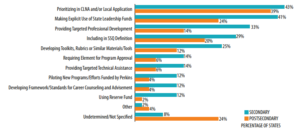![]() In October 2020, Advance CTE released “The State of Career Technical Education: An Analysis of States’ Perkins V Priorities,” which examines how states have leveraged the development of the Strengthening Career Technical Education for the 21st Century Act (Perkins V) state plans to expand quality and increase equity within their Career Technical Education (CTE) systems.
In October 2020, Advance CTE released “The State of Career Technical Education: An Analysis of States’ Perkins V Priorities,” which examines how states have leveraged the development of the Strengthening Career Technical Education for the 21st Century Act (Perkins V) state plans to expand quality and increase equity within their Career Technical Education (CTE) systems.
Perkins V includes an increased focus on career development and advisement, which is critical for ensuring that each learner can learn about, access and be successful in high-quality CTE programs. Career development and advisement is also a crucial component of states’ equity strategies because they help learners navigate increasingly complex education and workforce development systems on their way to a rewarding career, as well as support the broader social-emotional needs of CTE learners.
Perkins V plans indicate that states are undertaking a number of efforts, at both the secondary and postsecondary levels, to provide robust advisement and related supports for learners. Based on Advance CTE’s analysis of state Perkins V plans:
- Nearly half of all state plans (22 total) prioritize advisement efforts at the secondary level through their comprehensive local needs assessment (CLNA) or local application processes, and 39 percent of states (20 total) indicate the same for the postsecondary level.
- Approximately 40 percent of states (21 total) indicate in their Perkins V state plans that they are using at least a portion of State Leadership dollars for advisement efforts at the secondary level. However, only 24 percent of states (12 total) do so at the postsecondary level.
Another trend is the widespread state use of individual career academic plans (ICAPs) at the secondary level. While the degree that Perkins V funds directly support these efforts remains unclear, the fact that many states include references to their ICAPs in their state plans indicates that states are increasingly working toward more clearly connecting ICAPs to their CTE systems.
State Strategies to Advance Career Advisement

Key Innovations
- In Maryland, the state education agency is collaborating with the Maryland Business Roundtable for Education to recruit and prepare industry professionals to serve as career counselors at both the secondary and postsecondary levels. This initiative aims to increase the overall capacity of the state to provide robust career counseling services to all Maryland learners.
- Hawaii identified counseling and advising as a critical need in their CLNA and are designing a continuum of counseling and advising, which includes the development of a statewide framework including operational definitions, standards and expectations, and guidance materials in fiscal year 2021.
The Work Ahead
Many state plans do not distinguish between initiatives that are specifically driven by Perkins V and other efforts that states may already be undertaking to expand career development and advisement efforts. The work ahead lies in ensuring strong connections between CTE and advisement at the state, district, school and institutional level to collectively support each learner.
States must also attend to providing robust career development and advisement for learners at all levels. For example, while 90 percent of states are allowing Perkins V funds to be used for middle grades, most are leaving the decision of whether and how to support middle grades to local districts. There is a clear state role in supporting the expansion of middle grade advisement efforts so that learners can be fully aware of the opportunities available to them when exploring career paths and be better prepared for success by the time they enroll in a high school CTE program.
Additionally, given their role in helping learners transition to the workplace, postsecondary advisement activities are an especially important area that many state Perkins V plans do not address in any way. Ensuring that there are more robust support systems for learners at every level of CTE will help close opportunity gaps and position more learners for success.
Resources
- Advance CTE Resource Center: Career Advisement
- The State of Career Technical Education: An Analysis of States’ Perkins V Priorities
- The State of Career Technical Education: Career Advising and Development
- Policy Benchmark Tool: CTE Program of Study Approval
- Career Conversation Starters
- High School Career Conversations
- Middle School Career Conversations
- Elementary School Career Conversations
Christina Koch, Policy Associate
Jill Cook, Executive Director, American School Counselor Association (ASCA)
Tags: Career Advisement, Hawaii, Maryland, Perkins V, school counselors

